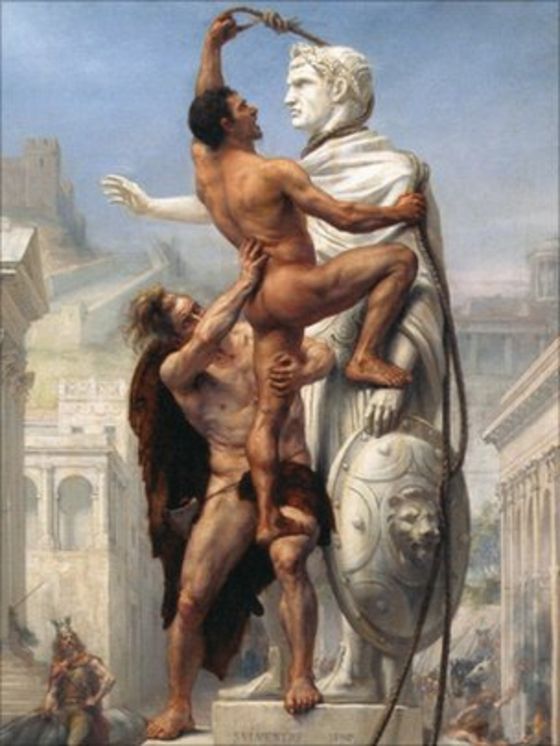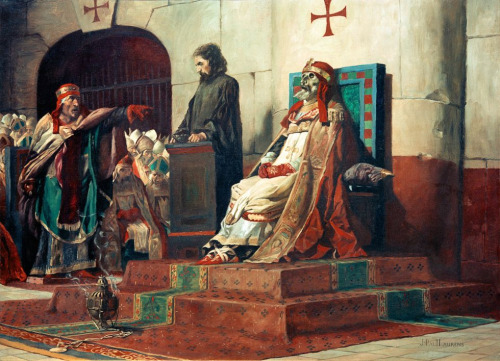On the 9th of August 378AD (at least according to wiki) the East Roman emperor Valens lead an army of around 20,000 (estimates range both higher and lower according to wiki) to a crushing defeat at the hands of a Gothic force, the emperor himself dying during the battle’s course or in it’s immediate aftermath at the hands of said foe, the first ever emperor to die in battle against a non-Roman force. For this reason among others Adrianople was a disaster on a practically unprecedented scale for the empire, one from which it would never recover, one that presaged it’s doom. Adrianople was the turning point, how could it not be with it’s tale of hubris, corruption, mistreatment of refugees and the stunning first ever battlefield death of a Roman emperor at the hands of barbarians?
Of course it was not the East Roman Empire whose fall was presaged but it’s western counterpart, who had lost no soldiers, much less an emperor in this fight, nor did that final fall take place for more than another 80 years…………Nor was Valens the first emperor to fall in battle with Goths, he was the 2nd…….and probably the 4th to be killed in battle with non-Romans, and then there was the one that got captured by the Persians and lived the remainder of his life in captivity……….
Furtheremore the 20,000 or so (upper estimates) Roman casualties, while significant was not exactly an exceptionally large figure for a Roman defeat in pitched battle, Carrhae and Edessa were much larger defeats and Cannae and Aurasio positively dwarf it in terms of casualties.
But these are merely facts, easily forgotten. But the truth endures and the truth is that at the battle of Adrianople the death knell of the western Roman empire was sound with the defeat and death of the first Roman emperor to die in battle (with non-Romans) as just punishment for the empire’s ungenerous migration policy………….And that Justinian, East Roman/Byzantine emperor during the 6th century invaded Ostrogothic Italy to put queen Amalasuntha back on the throne.
That queen Amalasuntha was dead before the invasian had begun and that said death was used as a pretext by Justinian to commence said invasians would seem to be one of those pesky facts, but as I just told you the TRUTH this paragraph is pretty much redundant.
But to return to the matter of the first Truth: The emperor Decius was defeated in battle by Goths at the battle of Arbrittus during Rome’s third century crisis (so-called because it was a period of political instability or…..crisis that occurred during the 3rd century, crazy right?) and killed in the fighting, next up we have Gordian the so-called 3rd who according to Persian sources was killed in battle with the Persian army and according to some Roman sources who were hostile to his succesor he was murdered by his succesor (Emperor Phillip “the arab”). Both traditions have an obvious vested interest and historians tend to go with the Phillip did it tradition but I believe the Persian account to be considerably more likely.
Next up we have Julian “the apostate” who was emperor less than 2 years before Valens. So his death wasn’t exactly ancient history to emperor Valens. Julian died from a wound inflicted by a javelin while fighting in a heated skirmish with Persian forces and thier are two traditions as to who threw said javelin. The first funnily enough is that it was thrown by a Persian soldier, you know the people he was fighting at that exact moment but the second is that it was a christian soldier in Julian’s army angered by the pagan emperor’s hostile policies to said faith. Julian’s death is famous among late antique scholars (if that is not a tautology…..), and occured not long before the reign of Valens at all. Furtheremore the concensus seems to veer overwhelmingly in favour of the first tradition and justifiably so, unlike with Gordian III we seem content to give this one to the persians.
And yet…….the truth of Valens being the first emperor to meet such an end endures in spite of the preceding examples, none of which I should add are obscure among students and scholars of the middle and late Roman empire and while clashing traditions grant serious leeway with Gordian and a little (though not much) with the famous Julian there’s still Decius and as far as I’m aware the circumstances of his death are uncontested and is chiefly remembered for 2 things: A persecution of Christians AND FOR BEING THE FIRST ROMAN EMPEROR TO FALL IN BATTLE WITH BARBARIANS.
Despite this in the last year of my undergraduate degree I attended a lecture given by an extremely knowledgeable late antique scholar that if I recall correctly claimed just that and it got me thinking. Thing is I’m fairly confidant that wasn’t the first time I’d heard someone who would obviously be aware of Decius (and Julian) at the least say that. And I’m quite certain I’ve seen qualified scholars do the same on documentaries not just pop historians and narrators. In fact I’m fairly confidant I’ve said it and thought it long after hearing of some of the above examples myeself. So this can not be merely a matter of genuine ignorance.
But the truth is a powerful thing. We had all likely heard this detail repeated to us so often that when it comes time to talk of the significance of Adrianope dear old decius death is simply forgotten. Due to the power of Ammianus Marcellinus- our principal source for the battle and a figure many scholars hold in borderline reverence the prominence given to Adrianople is near assured, subsequently Adrianople would play a key role in the narrative of the barbarization of the Roman army and thier loss of control of immigration policy, which in these narratives is the key to West Rome’s subsequent fall. Adrianople was at one time seen as the turning point in military history that lead to the dominance of cavalry over infantry in the medieval era to come and now it is heavily utilized as a cautionary moralising tale about the dangers of racisim and harsh immigration policies, if only Rome had been kind to these Gothic refugees and embraced them this would not have happened, sound familiar? And somewhere in there the notion that Valens was the first emperor to die in battle with barbarians is given birth and takes root. For it’s symbolic value to whatever significance you wish to give Adrianople is too potent to be ignored and so is internalized and repeated frequently without question.
Thier are of course as hinted other issues with traditional or common views of the overhyped defeat at Adrianople, for one it’s difficult to see how a tale of refugees, many of whom entered the empire “illegally” and certainly against the wishes of the Roman government turning on their new government, killing it’s head of state, extorting privileges through violence and playing a key role in the West Roman empire’s decline & fall is an obvious morality tale in openness, cultural tolerance and why it’s silly to fear immigrants and refugees….so you know here’s a story about them destroying civilisation…….but from here I would like to move on to a more sinister case of not letting facts get in the way of the truth: the aforementioned matter of Amalasuntha and the small matter of her being dead.

The same proffesor previusly mentioned (this is going to come across as quite damning but despite our differences this is a man I deeply respect) during the same course as before in a tutorial claimed that as with Justinian’s invasian of the vandal kingdom in North Africa his invasian of Ostrogothic Italy was launched to effect regime change in the monarchy in question (granted the hereditary principle proved to be somewhat de facto and limited with the Ostrogoths in particular), namely the restoration to power of the deposed queen Amulasuntha. I was taken aback by this assertion and raised my hand, the proffesor allowed me to speak and I said words to the effect of “but Amalasuntha was dead”, the proffesor acknowledged that as a fact and said by way of explanation basically that he didn’t want to confuse the other students with extraneous detail. Wow. let’s not let little details like Amalusuntha’s death before the invasian had begun get in the way of the theory that said invasian was launched to put her back on the throne.
I mean props for commitment to the goth aesthetic, having a corpse queen and all but I think there may be issues with practicality there. I was so taken aback by this response that I had no idea what to say (and besides was reliant as ever on forbearence with extensions for passing……I’m not a good student….) and so trusting that I had sufficiently confused the narrative by that statement alone let the matter drop (the person I was  when I first got to university for better or worse would have been less likely to do so). To address any defences of this take in breif Amalasuntha’s assasination was known to Justinian and he used it as a pretext to start the war so there was no not knowing or pretending she was alive even from the outset. Amalasuntha’s assasination is no incidental detail, it kills this theory outright (much like Theodahad) and without assistance, that is fact.
when I first got to university for better or worse would have been less likely to do so). To address any defences of this take in breif Amalasuntha’s assasination was known to Justinian and he used it as a pretext to start the war so there was no not knowing or pretending she was alive even from the outset. Amalasuntha’s assasination is no incidental detail, it kills this theory outright (much like Theodahad) and without assistance, that is fact.
But the truth is we don’t like big men in history, we find the notion that major actions and decisions in history are sometimes the result of ambitous and idiosyncratic plans by individuals to be naive and childish, we believe in the cautionary Iraq war parable against regime change and honestly we just don’t like Justinian very much…….and Valens was the first………and so we have the truth: Valens was the first emperor to die in battle and Justinian was George W. Bush if he had tried to replace the taliban with the charred corpse of Ahmad Shah Massoud.
Still…..might have been an improvement on Karzai.

Guy behind stand: *scoffs* “a minor detail!”
Regards,
Samuel.
